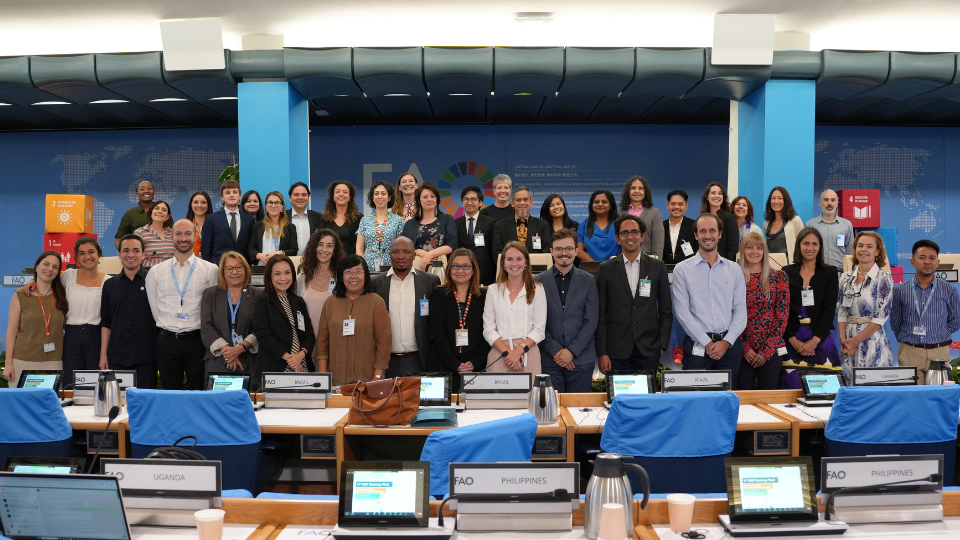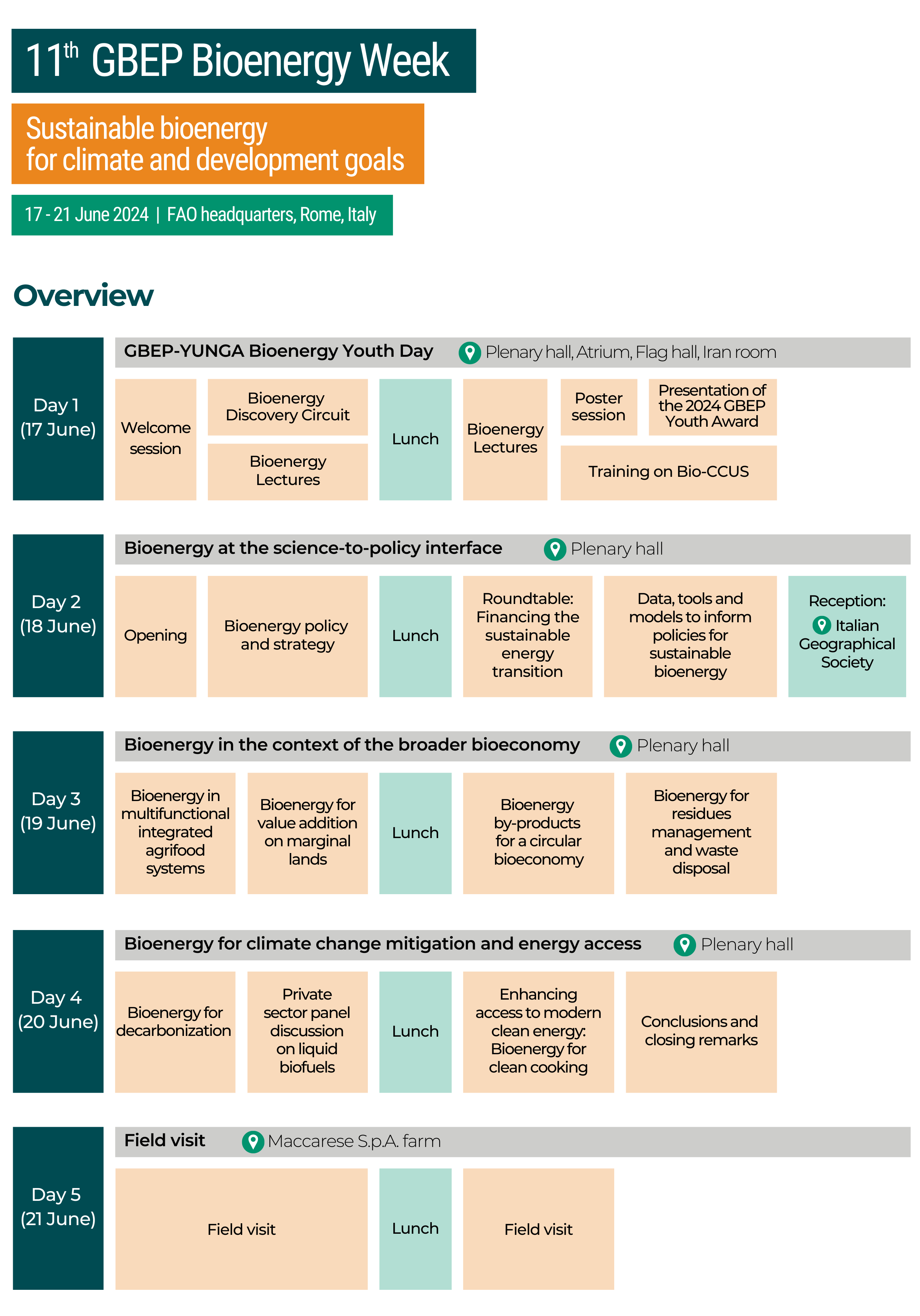11th GBEP Bioenergy Week
Sustainable bioenergy for climate and development goals
Hybrid Event, 17/06/2024 - 21/06/2024

Background
Since 2013, the Global Bioenergy Partnership (GBEP) has organized an annual Bioenergy Week in different regions. In 2024, for its 11th edition, the Bioenergy Week was held in Rome, Italy, from June 17 to 21. The event was organized by the Food and Agriculture Organization of the United Nations (FAO) in collaboration with the Italian Ministry of Environment and Energy Security, and supported by the US Grains Council (USGC). Unlike previous editions focusing on regional priorities, this event had a global perspective.
Objectives
The GBEP Bioenergy Week brought together over 200 stakeholders, including international experts, policymakers, industry leaders, researchers, and students. They discussed trends, opportunities, and challenges in bioenergy. The event aimed to enhance learning from positive experiences in sustainable bioenergy production and use within agrifood production value chains. It also aimed to foster dialogue with the private sector and other stakeholders to improve cooperation towards a clean energy transition.
Sustainable bioenergy for climate and development goals
The Bioenergy Week seeks to support efforts to ensure that bioenergy can play a constructive role in achieving the UN Sustainable Development Goals (SDGs) and implementing the Paris Agreement on Climate Change, thereby advancing climate goals, food security, better land use, and sustainable energy for all. Each day of the five-day conference focused on a different theme:
DAY 1 (17 June) - GBEP-YUNGA Bioenergy Youth Day
The week started with the GBEP-YUNGA Bioenergy Youth Day. Organized in cooperation with the Youth and United Nations Global Alliance (YUNGA), it included educational and training activities on sustainable bioenergy. Students participated in a bioenergy discovery circuit and lectures. Czaneil Gomez from the Philippines received the 2024 GBEP Youth Award for her study on using rice straw for biogas.
DAY 2 (18 June) - Bioenergy at the science-to-policy interface
Enabling bioenergy expansion that supports SDG implementation requires that policies and measures to promote best practices are put in place. These should consider the variation in conditions across continents and countries, ensure biodiversity safeguards, and promote multiple ecosystem services in landscapes. On this day participants explored bioenergy policies and strategies, along with the supporting data, tools and models necessary for their design, monitoring and evaluation.
DAY 3 (19 June) - Bioenergy in the context of the broader bioeconomy
Bioenergy is part of a larger bioeconomy, including agriculture, forestry, fisheries, and the manufacture of food, paper, wood and agricultural fiber products, biomaterials, bio-based chemicals and medicines. Participants examined the contribution of bioenergy to bioeconomy and explored integrated multi-functional agrifood systems that ensure high resource use efficiency and reward sustainable production and use, supporting the provision of sufficient food and animal feed for a growing population, as well as biomass for bioenergy and other valuable bio-based products.
Discussions also looked into the various co-benefits that biomass production systems can provide, such as enhanced landscape diversity, habitat quality, retention of nutrients and sediment, erosion control, climate regulation, flood regulation, pollination and biological pest and disease control. Specific sessions also delved into the use of degraded or marginal land as an option for biomass production that helps restore soil productivity and avoids or mitigates competition for higher quality land, as well as the use of bioenergy for waste and residue management, and the use of bioenergy by-products.
DAY 4 (20 June) - Bioenergy for climate change mitigation and energy access
During this day, participants tackled good practices and innovative solutions for ensuring that the deployment of bioenergy contributes effectively to climate change mitigation and access to affordable, reliable, sustainable and modern energy for all. Global biofuels deployment will continue to expand in the near future, with biofuels remaining the dominant pathway for avoiding oil demand in aviation, shipping and heavy freight transport. In urban systems, biomass provides the feedstock for highly efficient heat and power district systems and household cookstoves. The first session focused on how bioenergy could contribute to the achievement of global climate change mitigation goals in various sectors.
Lack of access to energy in many developing countries is a fundamental barrier to reducing hunger and ensuring that the world can produce enough food to meet future demand. SDG7 seeks to facilitate access to affordable, reliable, sustainable and modern energy for all. This is not only an important goal in and of itself; it is also linked with many other SDGs. However, progress towards this goal is slow – more than 2.3 billion people (around 30 percent global population) still do not have clean cooking facilities, and about 800 million people do not have access to electricity. The final technical session of the conference considered the bioenergy options for enhancing access to clean cooking.
DAY 5 (21 June) - Field visit
The Bioenergy Week concluded with a field visit to a biogas facility located at a farm in Maccarese (45 minutes from Rome). The farm represents a successful example of an integrated production system that incorporates crop, livestock and energy production, co-existing with biodiversity conservation and ecosystem restoration. Participants visited all components of the farm, as well as the WWF Nature Reserve situated onsite.

Download presentations and other event materials here.
